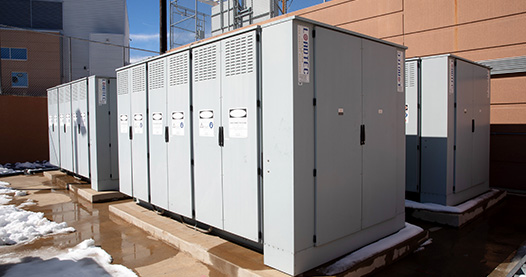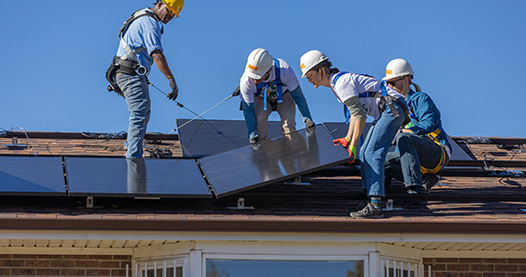Energy to Communities Program: Peer-Learning Cohorts
Energy to Communities (E2C) offers peer-learning cohorts to advance local energy goals. Peer-learning cohorts are funded by the U.S. Department of Energy and managed by NREL.

What Are E2C Peer-Learning Cohorts?
Peer-learning cohorts are multicommunity engagements that convene community entities around a common energy topic. Participants meet regularly for approximately 6 months to exchange strategies and best practices, learn in a collaborative environment, and workshop policy or program proposals, action plans, or strategies to overcome challenges.
In each cohort, experts provide up to 15 participants with case studies, analysis and modeling tools, templates, training materials, and facilitated collaboration to accelerate energy progress.
More than 200 community entities have participated in one of 15 cohorts.
Upcoming Peer-Learning Cohort Topics
The next round of peer-learning cohorts will start in January 2026. E2C is accepting applications until Oct. 31, 2025, for two cohorts:
Cohort Description
In this E2C peer-learning cohort, entities across the southeastern United States will explore strategies to quickly recover from impacts to energy infrastructure caused by extreme events, such as severe weather and natural disasters. Energy systems are
closely linked to social, economic, and infrastructure systems. Recovering quickly from major disruptions requires coordination across these systems, guided by established emergency plans and institutions. Cohort participants will:
- Explore opportunities to establish or improve their local hazard mitigation plans and emergency management response procedures
- Learn about established statewide emergency management planning and response structures
- Explore backup systems for critical facilities.
Workshops will focus on opportunities to partner with electric utilities to enhance energy reliability, modernize grid infrastructure, and implement smart technologies to prepare for and respond to extreme weather.
Expected Outcomes
Subject matter experts and cohort facilitators will guide participants to identify the planning and recovery strategies that align with their local priorities, potential risks, and sociocultural context. Participants can leverage these strategies to develop
a set of next steps to improve the reliability and recovery of energy infrastructure in their jurisdiction.
Ideal Participants
Ideal participants include energy managers, emergency management professionals, facilities managers, and staff responsible for emergency response planning or ensuring energy infrastructure remains operational or rebounds quickly during and after weather emergencies. Priority will be given to entities in areas with significant risk of weather-related emergencies, grid instability, or long-duration power outages.
Eligible Entities
Applicants should be located in the southeastern United States.
Eligible entity types include:
- Local governments (cities, towns, villages, counties, etc.)
- Regional governments (councils of governments, etc.)
- Tribes, including stat- recognized Tribes.
Preview the application questions and apply by Oct. 31, 2025.
Cohort Description
Participants in this cohort will explore common challenges in implementing energy projects and learn strategies to turn project plans into reality. Each participant will focus on a local energy project or priority as a cornerstone for their learning throughout
the series. Workshops will provide opportunities to explore strategies to build internal and external stakeholder buy-in, identify and secure funding and financing, and accelerate siting, procurement, and construction.
Expected Outcomes
Participants will have the opportunity to create a personalized action plan for a priority energy project and get feedback from experts and peers to help move the project forward.
Ideal Participants
Ideal participants include energy managers, sustainability managers, resilience managers, facilities managers, project managers, and staff responsible for implementing energy projects (from public entities and Tribes) or partnering on local energy projects (from nonprofit organizations).
Eligible Entities
- Local governments (cities, towns, villages, counties, etc.)
- Regional governments (councils of governments, etc.)
- Tribes, including state-recognized Tribes
- Local nonprofit organizations
Preview the Successful Energy Project Implementation application questions and apply by Oct. 31, 2025.
E2C Peer-Learning Cohorts Participants
For a list of current and past cohorts, visit the Current and Past Peer Learning Cohorts page.
Eligibility
Peer-learning cohorts are intended for participants that have decision-making power or influence in their community entities but need access to additional energy expertise to inform upcoming opportunities. Eligible primary applicants for cohort topics may include:
- Tribes, including Alaska Native Villages, Alaska Native Corporations, and state recognized Tribes
- City, town, or county (local) governments
- Metropolitan planning organizations
- Regional planning organizations
- Municipal and cooperative utilities
- Community-based organizations
- Other public entities, such as transit agencies, school districts, and housing authorities.
Contact
If you have questions about E2C Peer-Learning Cohorts, please email E2C.
Sign up for E2C email updates to be notified when program applications open.
Share
Last Updated Sept. 15, 2025


